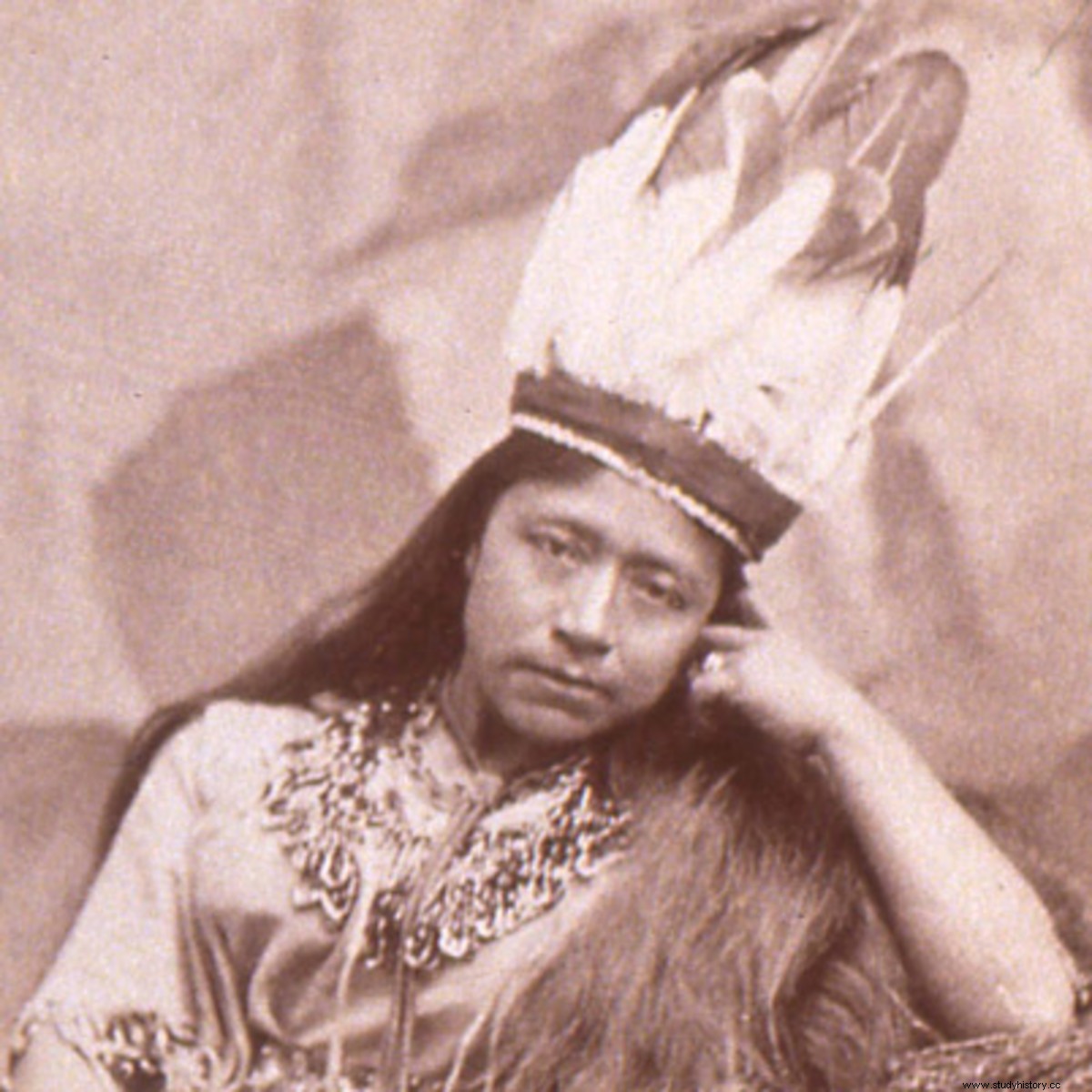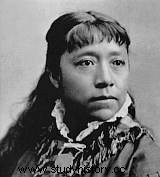Sarah Winnemucca (born Thocmentony or Tocmetone ) (circa 1844 – 1891) was a Native American writer from the Paiute people. She was a strong advocate for Native American rights, including fighting for the release of her people from the reservation to which they were deported.
A dual culture
Sarah Winnemucca was born around the year 1844, near Lake Humboldt (current Nevada, in the United States). She is the second of four children of Winnemucca, leader of a small band of Paiutes. His grandfather, Tru-ki-zo, established positive relationships with Europeans who began to explore the area, including helping them map the area and making many white friends.
Around 1850, when Sarah was six years old, her family moved to California and the adults began working in ranching. At the age of thirteen, Sarah, and her younger sister Elma, moved in with a settler family. They serve as company for the daughter of the family and do domestic work, while learning English and familiarizing her with Euro-American culture. Sarah learns to read and write English, that her whole family speaks, and develops a double culture.

The Lake Pyramid War
In 1859, Sarah Winnemucca and Alma returned to live in Nevada with their father, amid growing tensions between Paiutes and migrants. The discovery of silver mines in the region has indeed attracted many migrants, and incidents are increasing.
In 1860, Paiutes attacked a general store, in which two girls from their group who had been kidnapped were held prisoner, and killed three men by setting it on fire. The miners and settlers then organized themselves into a militia and the Lake Pyramid War broke out. The Paiutes, including Young Winnemucca, cousin of Sarah, prove to be better fighters and, after two pitched battles, a truce is concluded.
The massacre of the Paiutes
In 1861, Nevada became an American territory and James W. Nye, its first governor, met the Paiutes. US forces, however, harass Paiute groups, with raids, charges, and frequent accusations, including cattle rustling. In 1865, Captain Almond B. Wells led a group of "Nevada Volunteers" on random raids against the Paiute. While Sarah and her father are not there, Wells attacks the Winnemucca camp and massacres 29 of the 30 people, children and old people, who are present there. Winnemucca's two wives, including Sarah's mother, and her younger half-brother are killed.
In 1868, some five hundred Paiute survivors of these indiscriminate massacres sought refuge with the American army, at Fort McDermitt, from these Nevada Volunteers. There Sarah meets Lieutenant Edward Bartlett, whom she marries in Salt Lake City; but her husband abandons her and she returns to live at Fort McDermitt. Four years later, the Malheur Reserve was created and groups of Paiutes, but also Bannocks, settled there. Sarah also joins her, with her father and her brother Natchez.
The Bannocks War
 Within the reservation, Sarah Winnemucca works as an interpreter with Indian Agent Samuel B. Parrish, who represents the United States government with the tribes of the Malheur Reservation. Samuel B. Parrish maintained good relations with the Paiutes, supported them in the creation of agricultural programs and had a school built on the reservation; Sarah becomes a teacher there. But in 1876, to the great regret of the Paiutes, Samuel B. Parrish was replaced by the Indian agent William V. Rinehart.
Within the reservation, Sarah Winnemucca works as an interpreter with Indian Agent Samuel B. Parrish, who represents the United States government with the tribes of the Malheur Reservation. Samuel B. Parrish maintained good relations with the Paiutes, supported them in the creation of agricultural programs and had a school built on the reservation; Sarah becomes a teacher there. But in 1876, to the great regret of the Paiutes, Samuel B. Parrish was replaced by the Indian agent William V. Rinehart.
Rinehart's policy is the opposite of that of his predecessor:he does not pay workers for their labor in the common fields, sells goods intended for the Paiutes, expropriates Native Americans to give land to whites and alienates many tribal chiefs. The abuses became intolerable to the point that in 1878, almost all Paiutes and Bannocks left the reservation. The Bannocks then attack isolated settler installations. These raids, in which the Paiute may also have taken part - Sarah later wrote that she and other families were then held hostage by the Bannocks - sparked the Bannock War.
During the conflict, which lasted a few weeks and caused around thirty deaths, Sarah worked as an interpreter during the war, and acquired an excellent reputation with the officers for whom she worked. Favorably impressed by some officers, Sarah supports the US military's position of administering Native American reservations instead of corrupt Indian agents. Following the war, the Paiutes were deported to the Yakama Indian Reservation (which still exists today), where they suffered severe deprivation and extremely harsh living conditions.
The Paiute Reserve
Although not obliged to because she has a job, Sarah Winnemucca accompanies her people to the reserve to serve as an interpreter. Outraged by the harsh conditions suffered by the Paiutes, Sarah embarks on conferences in California and Nevada on the plight of her people. In 1879, accompanied by her father, she went to Washington to plead the cause of the Paiutes and ask for their release from the Yakama Reservation. It obtains authorization for the Païutes to return to the Malheur Reserve but, for fear of reprisals from the population on the way or new raids, the government has it closed.
In 1881, Sarah married Lt. Lewis H. Hopkins, an employee of the Indian Department. She continues to give conference after conference, in all the major cities of the Northeast of the United States, seeking to awaken public opinion on the fate reserved for the Amerindian peoples. The press frequently relays her speeches and speaks of her as the "Paiute princess". In Boston, Sarah met the sisters Elizabeth Peabody and Mary Peabody Mann, who encouraged her in her work and helped her publish her speeches and lectures. In 1883, his book Life Among the Piutes (Life among the Paiutes ), the first known autobiography of a Native American woman, is published. In 1885, Sarah returned to Nevada and established a school there for Native Americans, with the aim of promoting and protecting Paiute culture and language. But the federal government then decides to promote English language education for Native American children, and Sarah's school only operates for two years.
Sarah Winnemucca died on October 16, 1891 of tuberculosis.
